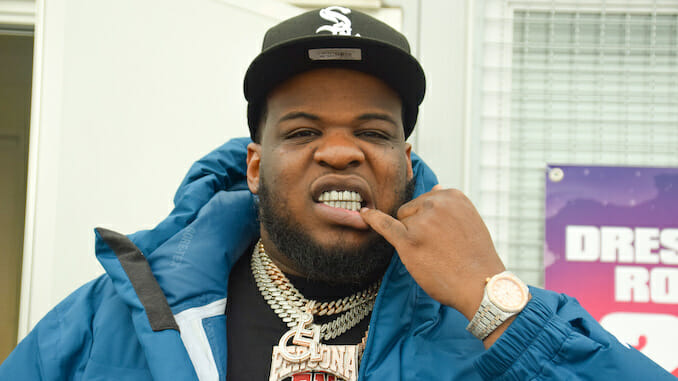Maxo Kream on Carrying the Weight of the World
Photos by Jade Gomez
Much of the press surrounding Maxo Kream focuses on the obvious: his intense stare, imposing figure and bleak storytelling in the same vein as his hometown predecessor Scarface. All roads lead back to fear, and the endless expanse of his dark pupils could certainly instill a hefty dose into the right person. For those more familiar with the Texas rapper’s work, there is also a playfulness present that others would dismiss. For one, his eyes light up as his massive hands grab the scruff of his tiny French bulldog, pointing the dog’s wandering eyes towards mine through our video call. Another one pops into frame atop the couch, dwarfing itself further when next to the rappers’s waist. “Their names are Biscotti and Balenciaga,” he tells me with a smile.
The last time I saw Maxo Kream on a couch was in a vlog with his girlfriend Kennedy Rae. The two matched in all black ensembles as they answered questions about their lives as a couple. At one point, he picked something out of her hair. I decide now is the perfect time to ask him about sharing that rare, candid video as his puppies scatter out of the room.
“It was a vibe for sho’, just a side people don’t get to see,” he says with an even larger grin. “But don’t get it twisted. Don’t play with me. Don’t think I’m so sweet. I’ll still have my foot so far up somebody ass, they’d be sucking my toes.”
This must be the Maxo Kream everyone else was talking about.
The rapper born Emekwanem Ogugua Biosah Jr. to a Nigerian father and American mother recently released his third studio album Weight of the World. As is the twisted fate of the world, with Biosah’s meteoric rise came the arduous wait for the other shoe to drop. His younger brother Money Mmadu was murdered in Los Angeles in March of 2020, only days before the world shut down and a few months after he welcomed Biosah’s niece into the world. His father, Biosah Sr., went back to jail. Another one of his friends is facing murder charges. His cousin died by suicide months after they buried Mmadu. Perhaps one of the most heartbreaking of all is his beloved grandmother falling into a coma. As Biosah reflects on these things one after the other on Weight of the World’s opening track “CRIPSTIAN,” it becomes clear what drives his music: survival.
“I been for real rapping since 21, maybe 20. I tried when I was 18 but I got so much beef in the streets that I can’t focus on rap,” he explains. “You look at NBA Youngboy and other n****s and they get into a lot of shit. At 18, you’re a little boy in a grown man body.”
By this point, it hit me why coverage of Biosah as a terrifying figure was so bothersome. It spoke to the parallels of how young Black men are portrayed in the media, most notably when Michael Brown, an unarmed Black teenager who was killed by Ferguson, Missouri police, was referred to as “no angel” by the New York Times.
“That’s a real crucial time. Being a young Black man, 17 through 21 in America, whether you’re in the hood or the suburbs—if you fuck up and do something wrong? It’s harder for a Black man. A mistake you made back then could fuck you over forever.”
Biosah’s vivid storytelling throughout his music should be taken as cautionary tales, a lesson he is still learning every day. He channels the paranoia and distrust he has for the world around him, a symptom of gang life, as he sees people such as fellow Crip Nipsey Hussle being killed by a fellow member. Where all of Biosah’s previous releases provided firsthand accounts of the darkest things he has encountered and committed, Weight of the World is the creeping guilt that slithers its way into bed with you before you shut your eyes, or the sudden pang of regret when you’re all alone. It’s also about change.
One of the most obvious signals towards change is on “LOCAL JOKER,” where Biosah reflects on the trauma and lessons he learned from his life growing up in the midst of violence and crime. “Before I played freeze tag, I played kick door / Before I heard the word ‘romance,’ I heard the word ‘hoe.’” The clanky drums lay down a lush blanket and muffled R&B horns echo as his hypnotic flow coasts through tough topics, such as the paranoia of seeing black Suburbans driving behind him and the ease with which he could kill someone over a pair of shoes in his formative years.
-

-

-

-

-

-

-

-

-

-

-

-

-

-

-

-

-

-

-

-

-

-

-

-

-

-

-

-

-

-

-

-

-

-

-

-

-

-

-

-








































